Ranked in importance:
AI will not lead to explosive economic growth in the near future.
Many native populations in developed countries will undergo contractions.
America vs China will be the conflict of the 21st Century.
The woke strikes back.
Climate change and contracting populations will be used to agitate for mass third world immigration.
Anti-intellectualism will grow.
Risk aversion will stay high.
Genetic political polarization will grow.
Culture will stay stuck.
More outliers, particularly in health.
Anti-aging is not coming soon.
Collapse is unlikely, but possible.
Network states will not take off.
Religiosity is not coming back.
Esports will not become the new sports.
Factory farming is not going away any time soon.
Self-driving cars are not coming soon.
Developed countries becoming dictatorships is unlikely.
AI girlfriends and boyfriends will not take off.
Testable prediction: the AI bubble will pop by 2032. Even if it does end up being legitimate, the scenario at hand looks too similar to the internet bubble in the 90s. (I no longer believe this because I don’t think the AI productivity gains are priced in yet).
1. AI
In forecasting it is best to rely on the outside view, which is based on comparing the current situation to similar situations and assess what happened, rather than use the inside view, where a prediction is made based on the mechanics and details of the situation. One vision of the outside view is promoted by David Roodman, who estimates that an explosion in world GDP will happen by 2047:
In research on expert judgment, Daniel Kahneman and Amos Tversky argue for challenging inside views (informed by contextual specifics) with outside views (based on historical “base rates” for certain event types). A reasonable inside view of the prospects for the global economy in this century is that growth will converge to 2.5%/year or less: population growth is expected to slow or halt by 2100; and as more countries approach the technological frontier, economic growth should slow as well. To test that view, this paper models gross world product (GWP) observed since 10,000 BCE or earlier, in order to estimate a base distribution for changes in the growth rate as a function of the GWP level. For econometric rigor, it casts a GWP series as a sample path in a stochastic diffusion whose specification is novel yet rooted in neoclassical growth theory. After estimation, most observations fall between the 40th and 60th percentiles of predicted distributions. The fit implies that GWP explosion is all but inevitable, in a median year of 2047. The friction between inside and outside views highlights two insights. First, accelerating growth is more easily explained by theory than constant growth. Second, the world system may be less stable than traditional growth theory and the growth record of the last two centuries suggest.
There is an alternative outside view: there are many generation-defining technologies, but only a few outliers like agriculture and industry caused explosions in the growth rate of the economy. The United States, for example, has had a fairly constant growth of 2% per year ever since the early 1800s.
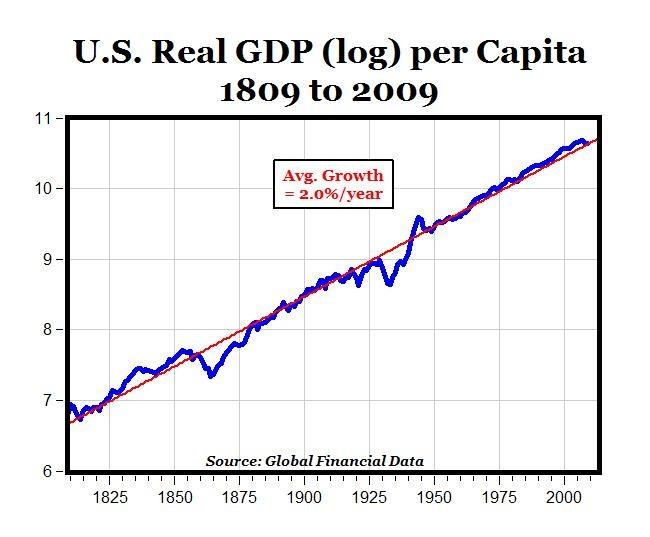
I lean towards thinking that this is the better application of the outside view. The only way this does not happen is if AI is much more generalized and agentic in the future.
Besides AI’s effect on the economy, people are concerned about risks that the use of artificial intelligence could have, which seem to boil down to 7 different concerns:
It will have racial/sexual biases.
It will have political biases.
It will leave people unemployed.
It will have negative second order effects that are hard to predict (Kaczynski perspective on technology).
It could be used for nefarious purposes (e.g. creating pathogens, hacking).
It could do bad things by optimizing for a narrow outcome (paperclip argument).
It could dominate humans as humans dominated nature.
Most of these concerns are unconvincing. Frankly, I could not care less if some people lose their jobs because AI outproduces them, or if AI turns out to have biases. The paperclip argument is a joke; any generalized learning mechanism that could be able to do massive amounts of harm by optimizing for a benign variable would also be able to understand human values enough to know how to optimize for it. Non-general intelligences like GPT4 already understand human values better than the vast majority of humans.
Domination is a nonissue until strong, generalized, agentic machine intelligence arrives. It’s unclear, exactly, how the game theory of a struggle between generalized intelligences and humans works out — perhaps they try their best to integrate into society as humans, perhaps they will form coalitions with humans, or perhaps they will indeed see machines as an identity group with their own interests and try to dominate us.
Human and artificial intelligence are conceptually and practically very different, and the idea that there will be “artificial general intelligence” by 2030 is ridiculous and unsubstantiated. If generalizability was a property that emerged from scaling currently available algorithms to sufficient size, then it almost certainly would have been found already; if it is a property that emerges from scaling up an unknown model, then it’s unlikely that it will be found soon; and there is of course the possibility that the general intelligence that humans possess is too complex to replicate in machines.
Out of the concerns listed, AI’s potential for terrorism is the most dangerous, but gets the least amount of attention. Unfortunately, given that slowing down technological development is impossible, further acceleration is the only answer. The consequence of this misuse is unclear; this is where great man theory starts to play out. If AI is used to commit terrorism, that will likely encourage regulation, constraining its effect on economic development.
In terms of social effects, Thiel once speculated that AI would be worse for the math people than the word people, and I could see that happening: AI will democratize access to technical, esoteric knowledge to verbal integrators who can creatively combine knowledge into a greater form. I doubt that what determines success on an individual level will change very much — intelligence, agency, openness, luck, and extraversion will always be useful.
2. Population contraction.
Fertility is tanking globally, particularly in the developing world, and there is no reason at the moment to think that fertility will revert back upwards within the next century. Because of this, the average age in most societies should be expected to increase, at least until the beginning of the next century.
Culturally, ageing is understood fairly well: risk propensity, beauty, time spent with others, intelligence, thinness, health, and fertility peak in the early 20s; productivity peaks between the 20s and 50s depending on the field; social status peaks in the 30s; wisdom and prestige peak in the 60s. Based on a simple ageing model, one would predict that society will progressively get less beautiful, thin, productive, healthy, fertile, intelligent, and willing to take risks. That’s, frankly, not an exciting picture.
Lower fertility also means smaller population sizes, especially for developed nations. I have written on the subject before, and I think that the UN’s population projections are actually underestimating the degree to which populations will contract in the first world. Which would not be an issue if the social contract of the West was not a pyramid scheme.
Others who advocate for a more organic approach to pronatalism through cultural or social interventions I do not have issues with, although I remain in my position of anatalism — I don’t think population size matters that much in the grand scheme of things.
3. America vs China
A country’s power over the rest of the world is largely a function of its average IQ and population size. Most indicators which people use to determine national power like industrial capacity, cultural influence, and military strength are largely a function of these two things.
Currently, the UN predicts a population crash for China and a small increase for America.

I haven’t seen any serious GDP projections for both of these countries in the short term, so I made a projection based on the UN’s population projections and an assumption of constant growth. According to some GDP per capita data I have downloaded on my PC (not sure what the source is), these are the trends in GDP per capita growth for America and China:
A linear regression model predicts that China will have a growth rate of 5.6% in 2023 and 2.1% in 2044; for America the figures are 1.2% and 0.77% respectively. I simplified the projection to assume a constant growth rate of 3% for China and 1% for the United States.
According to the projection, China will be expected to surpass America in GDP by 2044: it will have a GDP of 45 trillion while America’s will be sitting at 30 trillion.
Whether this will actually come to pass is not obvious — it’s not clear how free China’s economic institutions will be in the future, how salient AI will be for economic development, or even how accurate China’s GDP statistics are.
The cultural center of the world will still be America; China does not produce culture that is consumed internationally, mainly due to race and its status as a political enemy of most of the developed world. Europe does not look promising either; most of the bold and inventive Europeans moved to America hundreds of years ago, and the rest of the world is either too small or too low IQ to matter.
4. The woke strikes back
A lot of people want to believe that wokeness will retreat. I’m afraid that it will not.
Some have argued that a reduction in cancellations implies wokeness is retreating, which is incorrect — active exertion of force and power are not a one to one correlation. Moldbug explained it best.
Analyses on word use in papers have been used to justify the theory that wokeness is in decline; take, for example, the change in use of terms associated with prejudice:
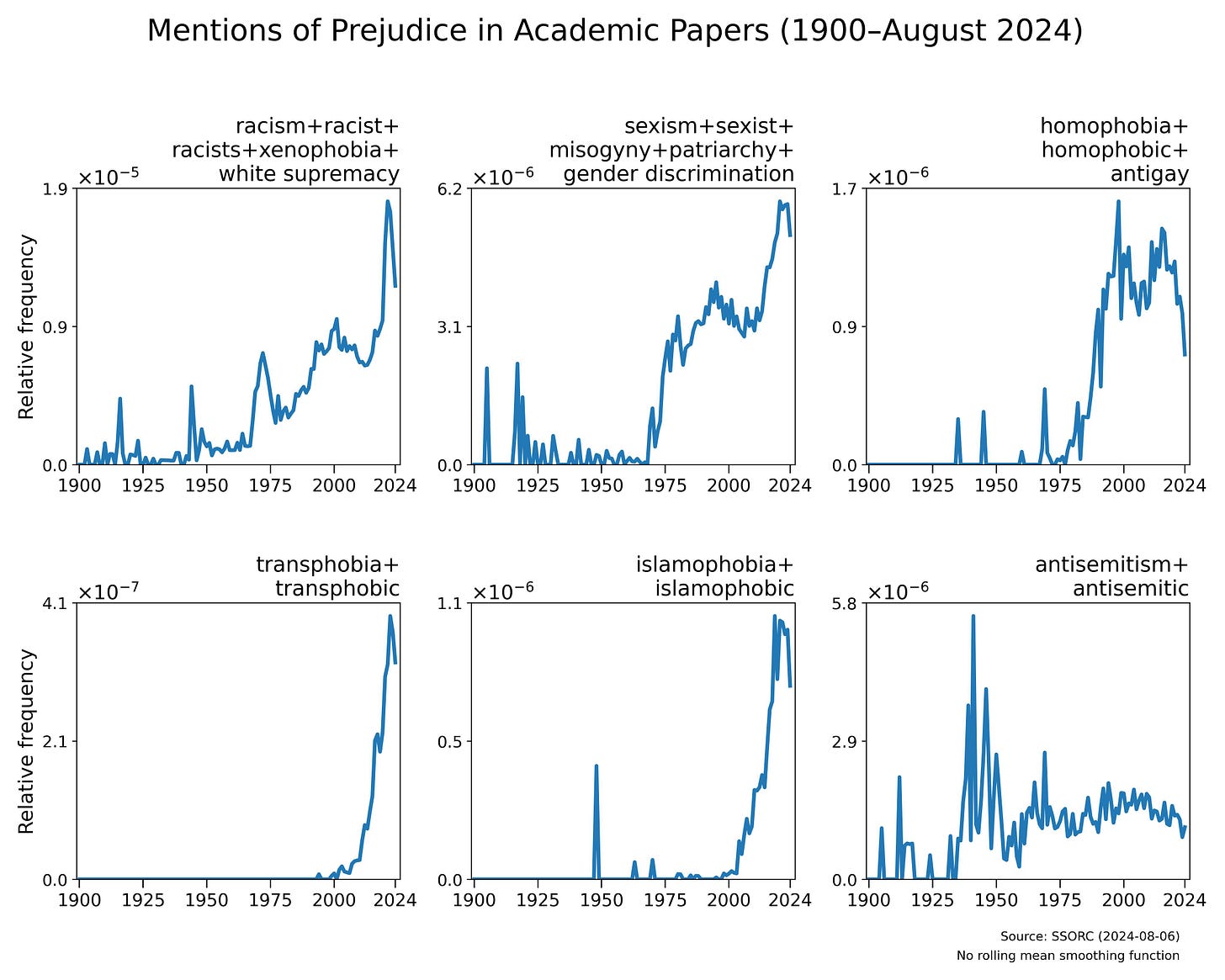
This trend, however, does not hold for DEI-related terms:

From what I see, use of positive terms is still as high as it used to be, but use of negative terms is on the decline:
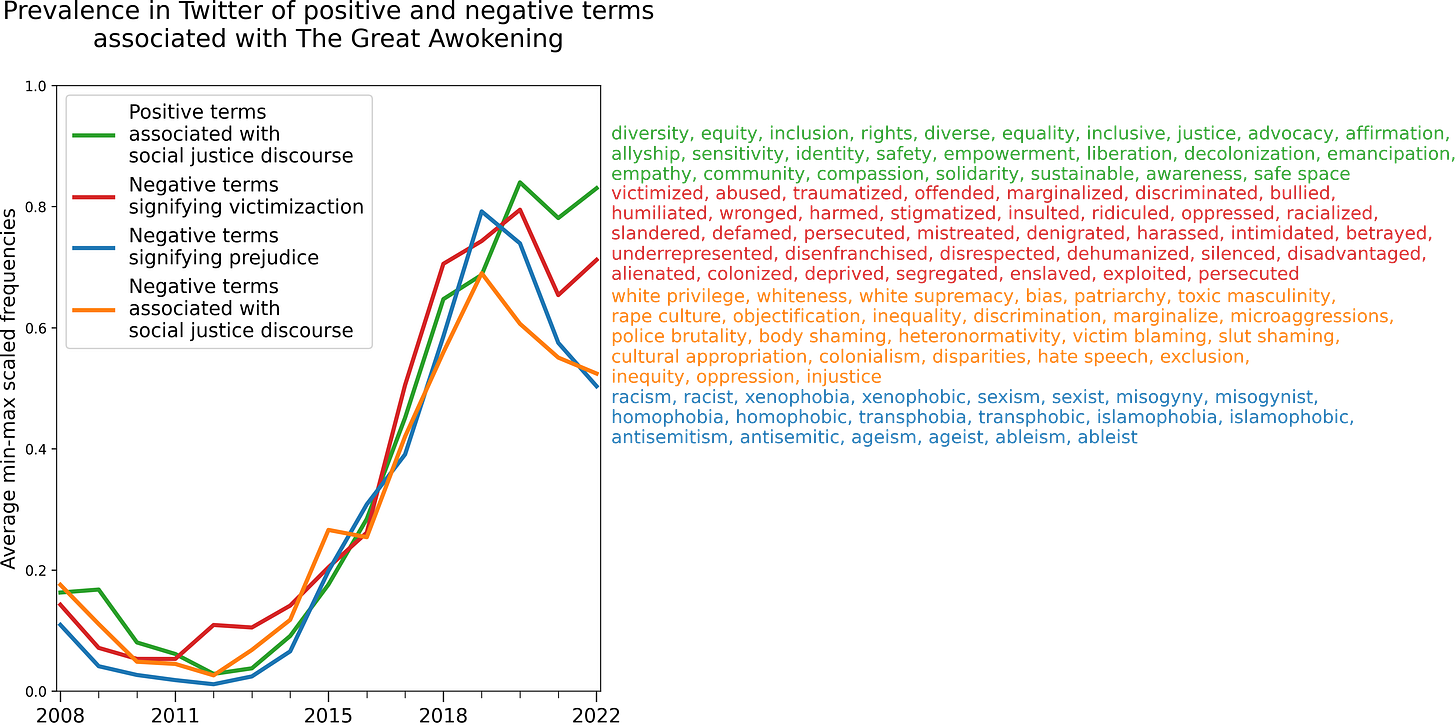
Like in the case of the cancellations, I also disagree that declining use of these terms in academia corresponds to a decline in the movement’s relevance; less usage could imply that scholars are starting to find less fruits on the tree of knowledge.
Conceptually, the left wins because lower status groups have more to gain by cooperating to parasitize the greater group than the higher status groups have to gain by empowering it. This pattern is observed practically everywhere: businesses, nonprofits, countries… The idea that wokeness is on the long-term decline is also poorly theoretically informed. Allow me to make a simple statement.
Leftism is “bad”.
People have had less sex but more sexual partners since the start of the sexual revolution. Market economies are more functional than state-run economies. Private healthcare is not worse than public healthcare. There is nothing stopping anybody from making libertarian data-driven arguments on healthcare, education and other issues that are much less sacred, yet leftism continues to exist.
Leftism may be “bad”, but it certainly has won — no need for the quotation marks there. Why should wokeness be considered any different? What exactly about wokeness should cause people to reject it, unlike the other aspects of leftism which have been unquestionably accepted? Because it is somehow worse than the other aspects of leftism which have already caused civlization to decline? Be serious, please.
Definitionally, wokeness is the sacralization of immutable identities: sex, race, and to a lesser extent sexuality, weight, class, mental illness, and ugliness; the term is novel but the phenomenon started in the 60s with civil rights law and feminism. The sacred impulse has always existed in humans, and as religion has died, people now have to exert that impulse in other areas of their life. As long as religion stays dead, wokeness will live.
Edit: I no longer agree with this view, and think that wokeness has started to abate. I doubt this change will be permanent, however.
5. Climate Change and population contractions will be used to agitate for mass third world immigration.
Climate change in terms of direct effects is overblown. The effect of temperature on the economy and climate is largely overstated and difficult to determine — see Unsettled by Steven Koonin. CO2 and methane emissions will cause temperatures to rise in the future, but it’s unlikely that this rise in temperature will translate to more severe weather or unbearable sea levels; though it could make living more difficult near the equator, especially in Sub-Saharan Africa and Southern Asia.
Regardless of how much of a problem this becomes, climate change will be used as an excuse to enable mass migration from the global south to the global north, in a “we did this to them, so we have to take care of them” way; HBD arguments will become less relevant when talking about race in the future. In a reality of declining populations, the idea of replacing natives with younger foreigners who want to move to the developed world also looks more attractive.
Whether these migrations will actually happen is hard to predict — the whole project will tank if somebody does the right thing and cools the earth through geoengineering. For this reason, I expect the left to continue to be opposed to geoengineering as it makes the political solutions they agitate for unnecessary. If they ever were, that is.
6. Growing anti-intellectualism
There are many reasons as to why people should become more anti-intellectual: the replication crisis, the decrease in selectivity of universities, and the fact that rationalism isn’t what it is made out to be. But suspicion of higher education has only taken hold in the American right as of now; other political factions are lagging.
I predicted a month ago that I thought the prestige of academia would nosedive in 50 years due to the fact that prestige lags competence, and that the competence of today’s academics is even lower than those that were hired in the late 20th Century. I still largely agree with what I wrote, but I think that I overplayed the extent to which this decline would occur due to academics and degree holders becoming more incompetent, as the trust people have in academics is more driven by politics than genuine competence.
Besides that, rationalism in general has been losing ever since the 70s. Words related to intuition and sentiment have been increasing in usage, while usage in words related to rationality has been decreasing.

Overall, I would consider this a negative trend. I am not pro-rationality, but to me, modern anti-intellectualism is closer to selective nihilism and is not the healthy balance between dogmatism and skepticism that characterized early science.
7. Growing risk aversion
Age increases in populations alone should be expected to drive up risk aversion, though risk aversion has been increasing recently in most Western countries, as evidenced by lower levels of drug use, crime, and sexual activity within the youth. My initial reaction was to blame it all on the digital revolution, when empirically, there is little evidence of this occurring:
Vashishtha R, Holmes J, Pennay A, Dietze PM, Livingston M. An examination of the role of changes in country-level leisure time internet use and computer gaming on adolescent drinking in 33 European countries. doi: 10.1016/j.drugpo.2021.103508.
In the fully adjusted model, for between individual effects, we found significant positive association between daily computer activities and regular drinking (β = 0.043, p-value <0.001 and 95% CI = 0.033–0.054). However, at a country-level, we did not find any association between within-country changes in daily computer activities and regular drinking (β = 0.031, p-value = 0.652 and 95% CI = -0.103–0.164.
Attempts to blame this on declining face to face interaction and increasing ages at initiation, on the other hand have been much more successful. There is a problem here — decreasing face to face interaction is a very unsatisfying explanation as to why risk aversion has increased — what caused the decline in face to face interaction is of much more salience.
Racial diversity probably accounts for a non-negligible amount of the decline in social engagement, but it cannot account for the decreases in externalization that have been found in many homogeneous European countries. The decline in movies, music, and television that occurred in the past 50 years is also probably a factor, but the aspect of entertainment that has caused socialization to plummet the most is probably specialization. Distribution channels were much more limited in the past — movies tended to be watched at movie theaters and the TV only had so many channels. Now, the increasing scale of society as well as modernity have enabled people’s entertainment to become more tailored: eccentric and autistic people will watch anime, active and upbeat people will listen to EDM, and big data allows recommendations to personalize content to consumers more effectively.
Calling Millennials the “I generation” was apt — empirically, people’s language use in English and Spanish has become more individualistic.
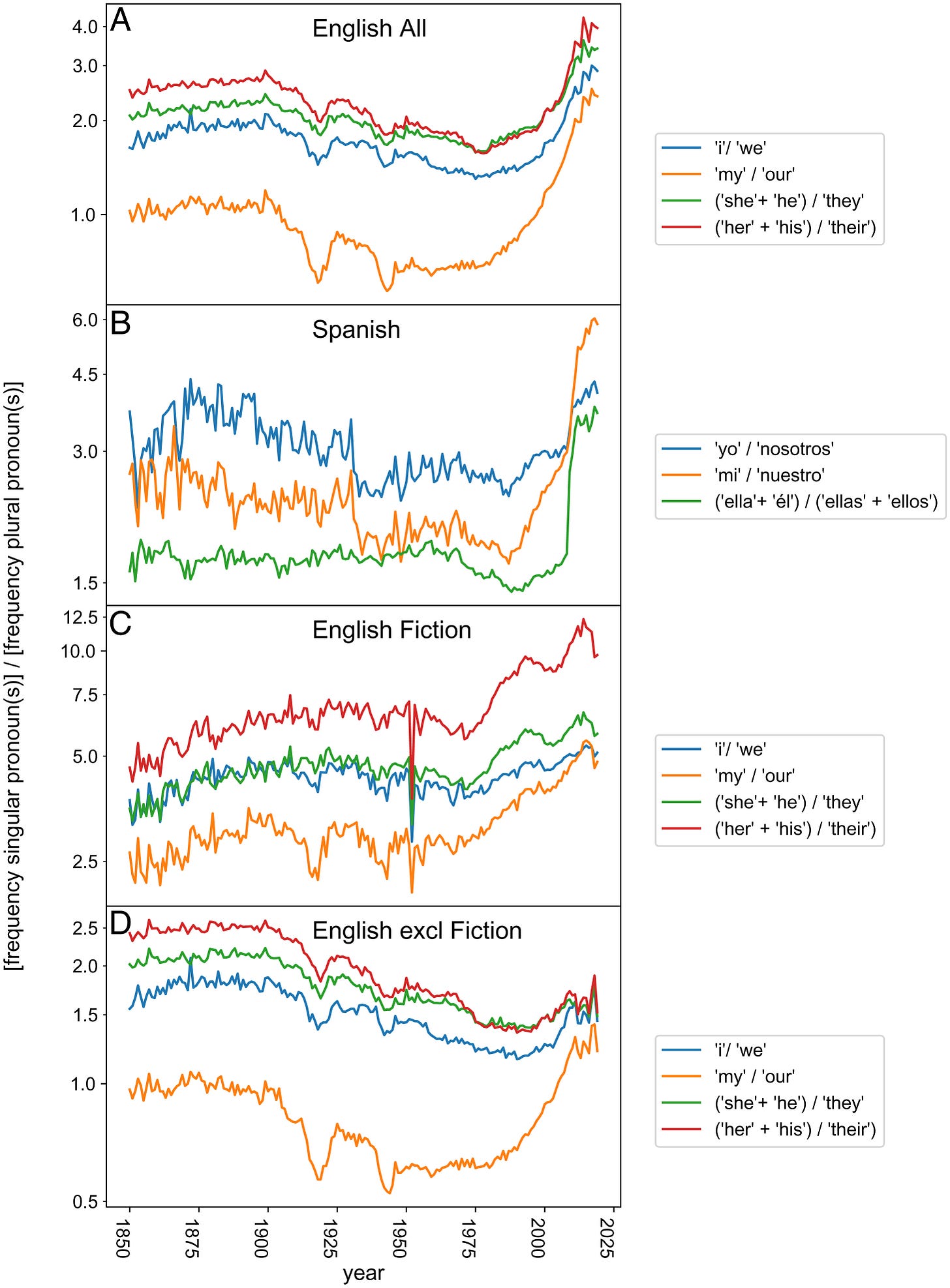
If people have become more individualistic and self-focused, it should be expected that people will engage in less socialization, as interest in others is to some extent a prerequisite for interacting with others.
Anecdotally, people talk about socializing, particularly dating, as being a chore — they understand it is a good thing to do, but is not something they will do out of their own will. Older generations seemed to do this naturally, but now the cost-benefit function has shifted.
Personally, I think this problem is a little overblown — socializing is not what it used to be and recreational drugs are not healthy to use. The larger issue here is that great achievement in art and business depends on a willingness to take risks. There is no Zoomer Zuckerberg; the biggest self-made hits of this generation are largely online influencers, not businessmen or founders.
8. Growing genetic political polarization
In the past, political conflicts were more transparent and transactional, usually involving class struggle or foreign policy. Now, they’re more opaque or sacred, involving more ideological conflicts or ones that involve markers of identity, such as sex, race, religion, and sexuality. That is, at least, my theory as to why the United States and to a lesser extent the rest of the world has become politicized.
These temporal factors should be expected to attenuate within some time, or by now. However, I predict that it will increase even more in the future, due to the fact that assortative mating for political views is extremely high (r = .60), they have a non-negligible heritability (40-50%), and that historically people have not assortatively mated based on political beliefs.
9. Stuck Culture stays.
It’s hard not to talk about this phenomenon without linking to Skallas’ iconic article on the subject: culture post the mid 00s has begun to stagnate. Fashion, movies, websites, design, all of it.
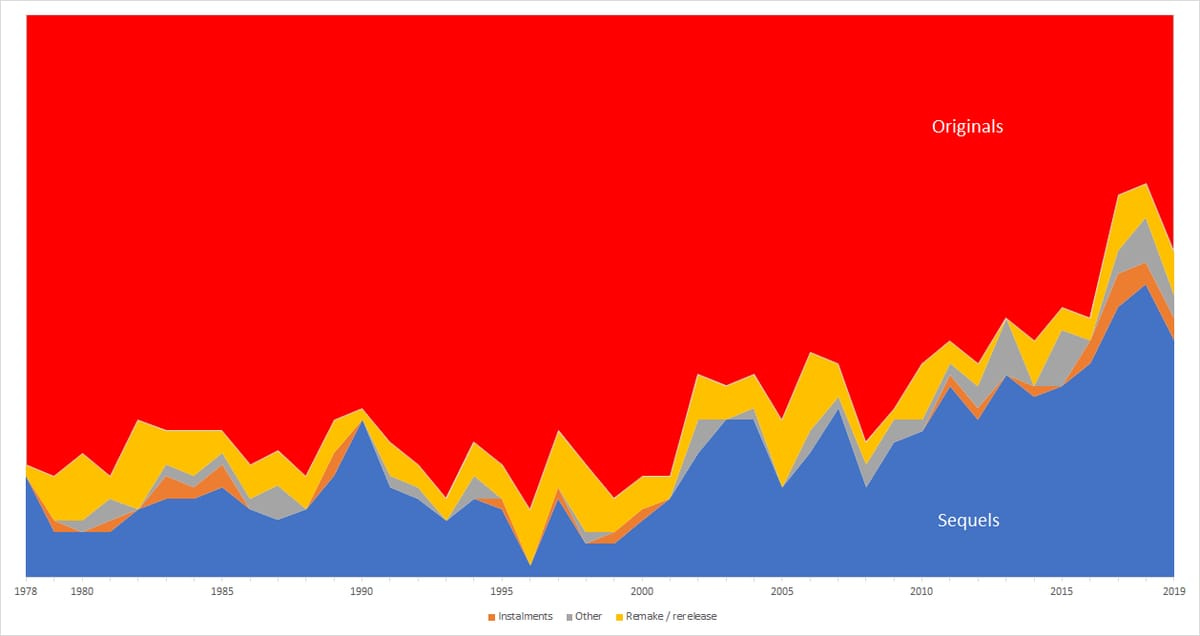

He also has a separate article titled Refinement Culture which is about a similar phenomenon, where certain aspects of life have become more refined: more A/B tested, safer, homogenized, and effective:
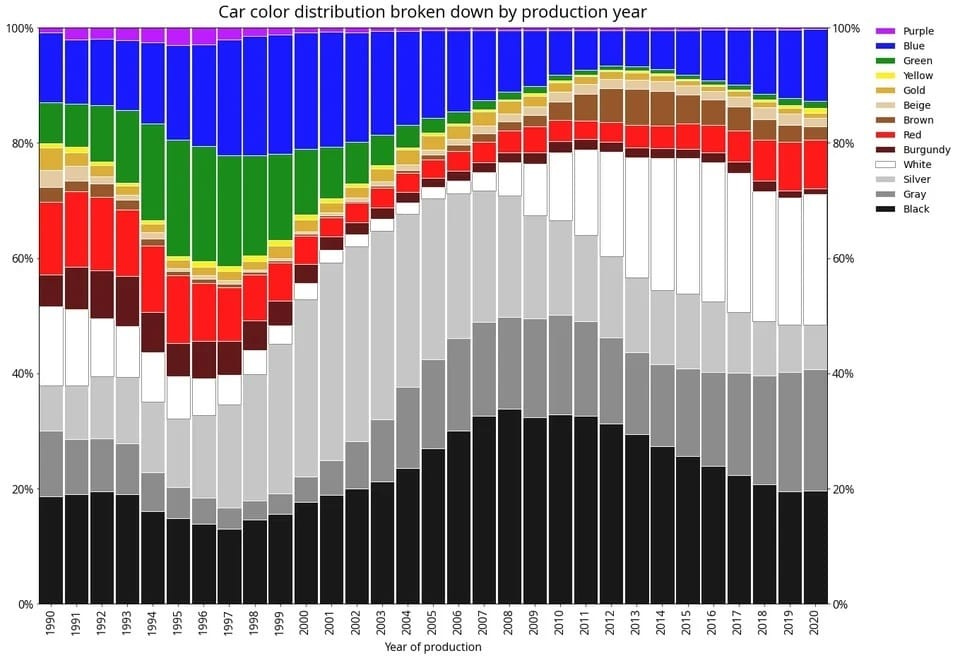
Skallas’ theory on why stuck culture happened is that algorithms began to decide what content is marketed and made, making the inputs convert into outputs, resulting in a never-ending cycle of regurgitation. There is no reason to think that stuck culture will stop, especially given that the biggest technology of our age is just regurgitation machines. Especially when the cultural lower hanging fruits have largely been picked.
I expect cultural stagnation and social cooling to either stay as is or even worsen, especially in the long term. We will have smaller and older populations, increased anti-intellectualism, and higher levels of risk aversion, which should contribute to less cultural development.
The only way I see this not happening is if, somehow, AI has a massive effect on the rate at which culture is created. Technology typically has a short term effect on cultural production — motion picture technology caused a golden age of film, or how there was a golden age of anime between the 90s and 00s, and the internet has created its own culture. The outside view dictates that this should happen again with AI at some point, but genes and environmental factors will not show up as strongly as they did for previous generations.
Anonymity will likely become less common online due to the fact that the elite have a convenient excuse to remove it due to the proliferation of computing and AI-agents. LLMs passing the turing test is a massive leap — now IDs or sophisticated verification mechanisms will be necessary for people to show they are humans, which will result in lower levels of anonymity online. Stylometry and voice based matching mechanisms should result in the doxxing of many big pseudonymous individuals by at least 2040. If this is happens, then I also expect this to contribute to a more socially cooled environment.
10. More Outliers
Variance in environmental factors has never been greater. Steroids, hair transplants, alt-health, dentistry, skin creams, operations, supplements, drugs, diversity in food, freedom of information, and refinement culture has brought health and fitness to heights never seen before. On the other hand, the availability of palatable food along with potential contaminants (lithium, fluoride, seed oils, xenoestrogens, microplastics, mycotoxins, SSRIs, heavy metals, pesticides, food additives) have created metabolic horror.
As such, I expect health inequalities to increase, and along with it, any trait that is affected by health (e.g. beauty, strength). I also expect this to be the case for knowledge — some people will abuse the internet to turn themselves into monks, while others will be glued to tiktok and other dopamine traps.
11. Anti-aging: not coming.
One group of 10000 young adults is randomly assigned Vitamin D, the other 10000 are assigned a placebo, and they are followed up for 80 years until they all die, and the efficacy of vitamin D in treating aging and the side effects it produces were all monitored.
Said no study on aging ever.
Limited human samples, small followup periods, poor monitoring of side effects, and the typical problems of institutional science plauge the longevity field. So people have resorted to other ways of knowing: mechanistic explanations, studies on rats, personal experimentation, anecdotes, and vibes. To make matters worse, a lot of supplements and medications that were initially considered anti-aging agents (e.g. NAD precursors, resveratrol, rapamycin) have started to fall out of favour due to null results or concerns about side effects.
I am not that familiar with this field, so making a well-informed inside view prediction is not possible. What I can say is that record life expectancy has been constantly rising at a rate of about 1 life year every 4 chronological years ever since the early 1800s, and it would be rational to think that it will continue rising at roughly this rate.
De Grey is convinced that within 20 years we will reach longevity escape velocity, where life expectancy will start to rise faster than chronological age, which allows people to live forever. I find this prediction difficult to take seriously; so much that I think he made this comment for social/economic/political reasons rather than scientific ones.
The main issue I see here is that out theoretical understanding of age is rather poor. Some argue that aging is caused by multiple causes, some say that it’s caused by metabolic adaptations that are good in the short term but bad in the long term, and others say it’s random damage. And even if it was well understood why humans age, it’s not clear if it would lead to anti-aging technology.
12. The (low) likelihood of collapse
Longtime readers of this blog or my old twitter account may know that I hate collapse theories. The issue is not necessarily that I don’t think that the West is extremely unlikely to collapse, the issue I have is that collapse theories serve a religious, social, and emotional purpose. If society is bound to collapse in 20 years, and everybody knows but you and your small circle of friends, the idea allows the group to stay tight-knit and feel superior to other humans who do not see the collapse coming. As the reasons why most people believe in collapse are irrational, nothing can convince them that they are wrong, so I rarely bother engaging with collapsists anymore.
Here’s the thing. Industrial society has existed for over 200 years — any theory that posits that the West will collapse soon must account for why it has not collapsed since then. Luck is not an answer.
Over the years, I’ve identified many different collapse theories, and have separate criticisms for all of them:
Social decay: Gobineau touched on this. The TL;DR is that social degeneration and economic degeneration correlate weakly within and across nations.
Dysgenics: less intelligent people tend to breed more, especially across nations, though the within nation patterns are somewhat more heterogenous. On average, IQs should be expected to decline about 3.5 points between nations per century, which is a fairly small drop. See full piece at CSPI.
Mutational load: my thesis is that if the mutations that cause infant morality generalize to other traits, then they should also be selected against in miscarriages/sperm/mating, which causes their proliferation in the gene pool to decrease. If the genes do not generalize, then genes that cause infant mortality may increase due to a lack of purifying selection, but that wil not to generalize to intelligence and other traits like that. Full explanation in an old post.
Climate change: meme, see climate section.
Nuclear war: real. Difficult to estimate the probability that nukes go off, but I would estimate it to be roughly 1% every decade. I suspect that the ecological and economic effects of them are overblown, though I have no evidence for this.
Pandemic: the world economy is extremely poorly equipped to deal with disease, but it’s unlikely that a disease outbreak would lead to institutional collapse, even if many people died.
Overpopulation: meme.
Underpopulation: meme.
Good times createl..: meme.
Resource depletion: meme. See Roko’s post on the issue.
AI risk: already expanded on this in the AI section
Historical cycles: descriptively exist, but are not an argument for why societies collapse.
Environmental collapse: don’t know much about the topic, though objectively, the world is getting better at dealing with contaminants over time.
13: Network states will not take off
The logistics of building an entire nation are already fairly complicated; admittedly it’s a problem that can be overcome with money and will, but the biggest barrier I see here is the fact that there are a lot of factors that impede normal people from moving to a random city: families, laziness, risk aversion, xenophobia, and loneliness.
Another big problem will be the sex ratio: men will far outnumber women in these locations, and there is no good way of dealing with this problem besides paying women to move and live in the area, which I don’t predict would be very popular. And if women do move, there is always the possibility that they sexually accuse powerful people who live there, which could lead to some interesting legal struggles.
There is also the possibility that foreign states will be hostile to emerging nations, which has no solution.
14. Religiosity is not coming back
There are two ways religiosity could come back: one is new religions, the other is older religions dominating.
New religions cannot be created anymore because people are too nihilistic and rational, so if it does come back, it must be existing religions becoming more prominent, either through genes or culture.
Genetically, it does not work: religiosity isn’t that heritable and the differential fertility is not impressive. Culturally, it's possible that a few high fertility religions survive, though I will note that mormon fertility has now tanked to replacement levels; if a religion wants to keep high fertility norms, it will have to be more socially isolated than mormons are from mainstream American culture. Which is… Difficult, to say the least. And I see no reason for the environment to suddenly shift to religious norms either.
15. Esports will not become the new sports
I used to closely follow many esports when I was 17-22, and I see many major issues for mainstreaming: esports are low status, players peak at extremely young ages, and it’s difficult to monetize because the audience for it is young and disagreeable.
I’ve gotta say though, pro gamers are really talented and contrast heavily with a world that for the most part is an uncompetitive and mediocre place. I miss those days.
16. Factory farming is not getting banned
Arguments about the is-ought distinction aside, no country has banned it yet, so I assume that will continue into the future.
17. Self-driving cars are not coming soon
When I was 14, they said they were coming in 5 years. And they didn’t.
Where are they?
18. Few, if any developed countries will become dictatorships
Same thing with factory farming. They haven’t come in modern, developed countries, so I assume that trend will continue.
19. AI girlfriends and boyfriends will not happen
Just, no.
Anybody shilling this has no idea why people, men in particular, want sexual partners.
A few other things that I may as well mention:
The recent mental health crisis. I suspect that there was some increase in psychopathology in the 20th century, but the 21st century phenomenon is a statistical illusion.
Space exploration. Usually, skepticism of space exploration is associated with having a negative opinion of Elon Musk — which is irrational. The issue with space exploration as a field is that it is spearheaded by some genetic freak who is dragging a corpse with bloody teeth. When he dies, the subculture will decline.
Digital nomadism. It’s a fad. It might stay cool in some subcultures, but the classic factors that stop people from moving as well as anti-immigrant sentiment are going to put a strong popularity cap on this.
Anti-social media research. There is no noumena under the phenomena.
Seed oils. I limit intake of them even though I have very little weight to lose. But the evidence of them being figuratively Satan is weak; they’re a Stalin at worst and an Obama at best.
Civil war. Like dictatorships: they just don’t happen.
Web3. Obvious fad.
Quantum computing. It’s snake oil — see Loklin’s piece on the field.
Entrepreneurship culture. It’s going to go through the subculture phase: first it is low status, then it becomes cool, then the strivers get in, then it becomes worse, then it culturally stabilizes.
Augmented glasses. Low status.






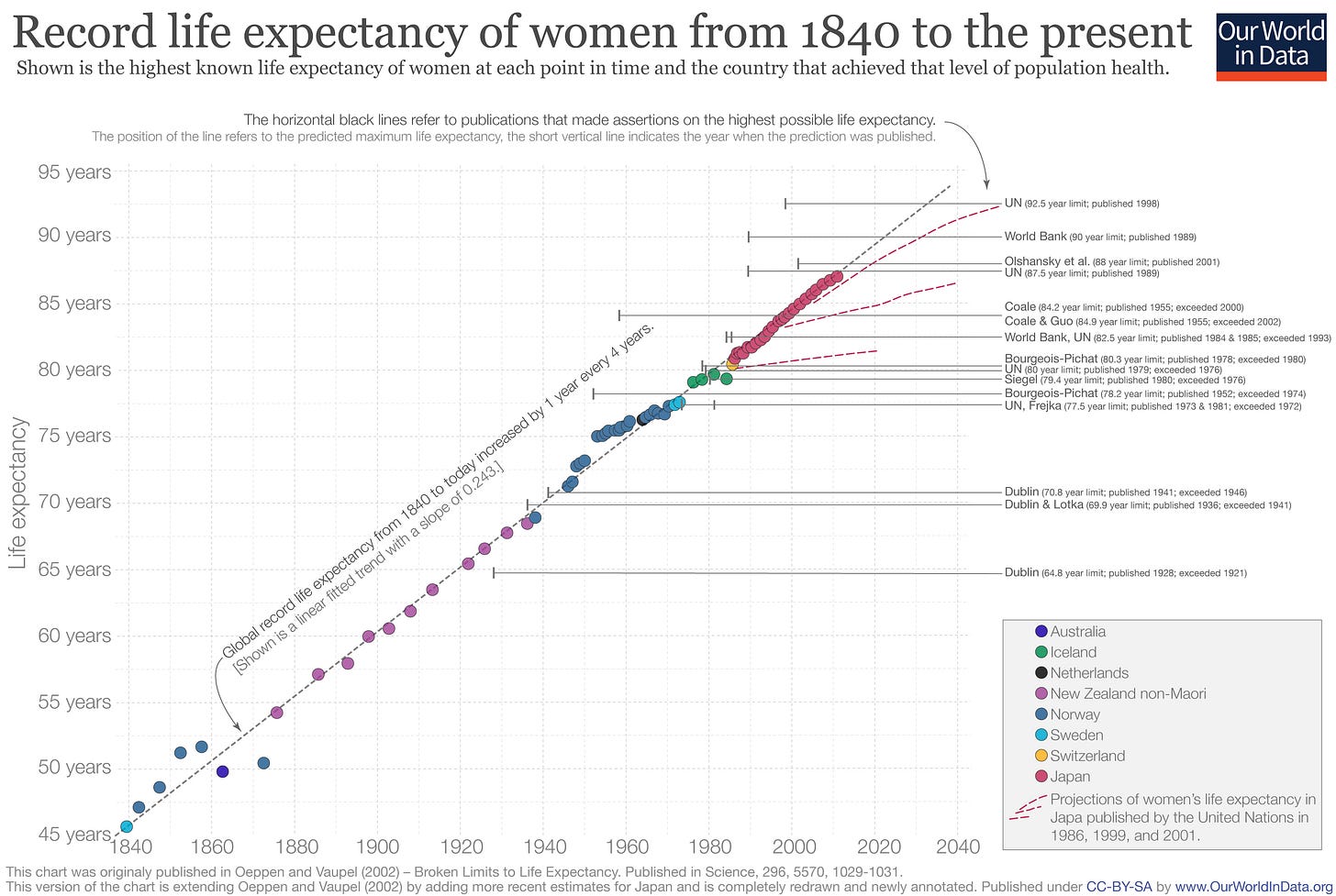
But you said we were gonna pass the longevity event horizon and turn back into 14 year olds on Twitter though
I didn’t believe it albeit. Medicine will continue to move at a grueling pace as long as clownish “ethical standards for experimentation” and “safety regulations” exist…
Surprised to see you didn't make a prediction about nuclear energy; or general developments on how energy will be sourced, transported, delivered in general in the next 50 years.
With regards to psychedelics, someone like you would be totally fine. Don't jump straight to the scary, intense ones (ayahuasca, ibogaine, DMT) – and make sure it's in an environment with a guide who is initiated and who knows what he is doing. Once you are married, you could consider doing an MDMA trip with your wife; will skyrocket your sense of partnership and intimacy.
Seed oils being Stalin is pretty bad!! Not something to scoff at and dismiss with a hand-wave. Causes a lot of unnecessary inflammation even with a strong constitution.